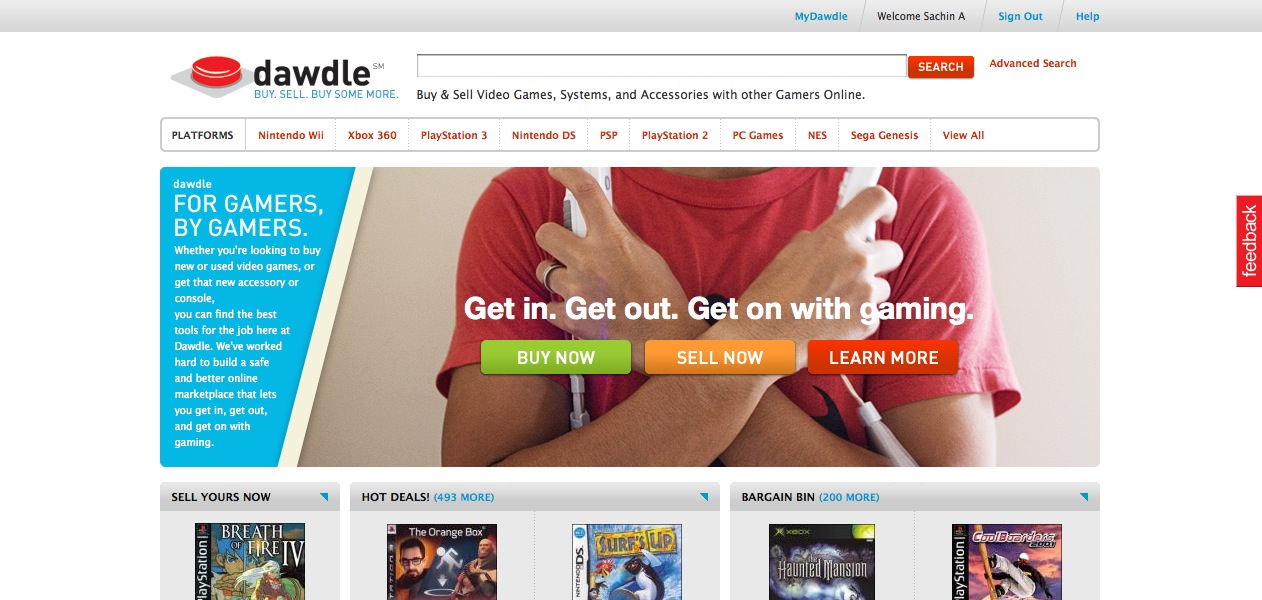 Dawdle is trying to come up with best site for selling used games and accessories. After an 11-month beta test, the company is formally launching its web site today. It is also announcing four partnerships that will help it improve its relevance for its customers.
Dawdle is trying to come up with best site for selling used games and accessories. After an 11-month beta test, the company is formally launching its web site today. It is also announcing four partnerships that will help it improve its relevance for its customers.
The Chicago-based company is the brainchild of Sachin Agarwal, who was inspired to start the company when he tried and failed to sell a PlayStation Portable on eBay and some other sites. In contrast, he claims, he has tuned his company’s online marketplace to suit gamers. One of the features resembles Priceline.com’s fixed price bidding. If you’re the buyer, you can set your own standing offer and wait for someone else to match all of the conditions. If they do, then you automatically complete the deal with a credit card on file. You can stipulate that the seller must have a four-star reputation based on past history.
“Our goal is to make it moronically easy to buy games,” Agarwal said.
He likens Dawdle to StubHub, which made it much easier to sell second-hand concert tickets. The standing offer feature, for instance, makes it a lot easier to buy a hot commodity, such as a Nintendo Wii console. Dawdle handles THE transaction and deposits the money straight into the checking account of the seller; buyers are given a 100-percent money-back guarantee. There is no listing fee and shipping is included in the purchase price.
In May, Agarwal added the ability to just go out and buy listed items immediately. Sellers can list 15 items in the course of a minute. One of the stated ambitions is to undercut GameStop, the giant video game retail chain with stores across the globe. Agarwal says gamers can’t make as much money selling games to GameStop. Dawdle lets those gamers get a good price for a used game, less Dawdle’s 12 percent commission.
Two new partners who make game sales software will help with that goal. Extreme Point of Sale and Wolf Track Software will collaborate with Dawdle so that independent retail store owners can immediately list their store’s entire inventory on Dawdle. Agarwal estimates there are 3,000 such stores across the country that can expand their business to include e-commerce with relatively little hassle.
Meanwhile, BRE Software will provide a used game price guide to Dawdle. It currently supplies the guide for independent retailers, but the BRE Software alliance will enable Dawdle to make recommendations to sellers on what prices they should set. The last partner, Fillz, makes online market management software that will enable gamers to keep track of large numbers of sales.
Agarwal has done a good job thinking this through. But he’s a late player in the market. The trouble is there is a ton of competition from companies big and small. Amazon, eBay, GameStop and others do a ton of volume in used game sales. GameFly rents games, just as Netflix rents out movies. But retailers such as GameStop don’t pay top dollar. But even though the market is competitive, it may be big enough for a lot of players. For instance, about 49 million gamers have bought used games, according to market consultancy OTX.
DAWDLE was started in July 2007 and launched its first beta in November. It has three full-time employees and about a dozen contractors. Agarwal said the company is raising a round now and hopes to announce it by the end of the year.
While the economic environment is tough for fundraising, Agarwal says, “Gaming is as recession-proof an industry as you can get. People cocoon and stay at home with games. We’re the ultimate Depression 2.0 company, since people want to extract value out of their used goods.”


